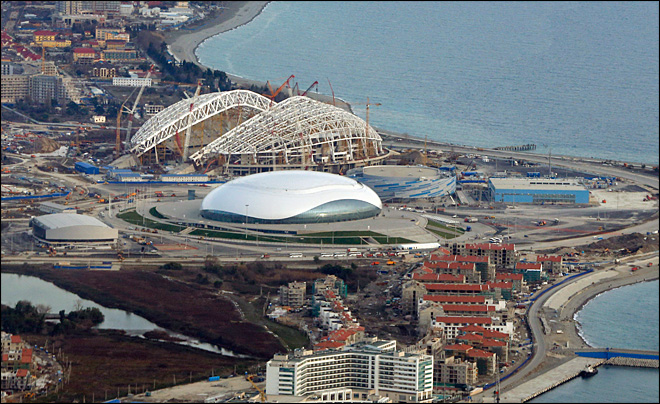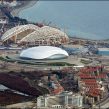
Russians Say Government Is Turning Sochi into a Concentration Camp
Publication: Eurasia Daily Monitor Volume: 10 Issue: 155
By:

On August 19, President Vladimir Putin signed a decree on special security arrangements for the city of Sochi when it hosts the Winter Olympics in 2014. The decree’s provisions envisage a complete ban on incoming automobile traffic in Sochi and its surroundings from January 7 to March 21, 2014. Special registration rules will apply for visitors of the city. Restrictions will also be imposed on crossing the border from the neighboring Georgian breakaway region of Abkhazia. Apart from restrictions on movement imposed on Russian citizens and migrants, the decree bans all types of public protests. Some areas of Sochi will be open to people only after official permission is obtained, while other areas will be completely closed to the public (https://www.rg.ru/2013/08/23/bezopasnost-dok.html).
Residents of Sochi have already referred to the government’s safety measures for the city as turning their city into an “Olympic concentration camp” (https://www.blogsochi.ru/content/ukaz-vladimira-putina-ot-19082013-?686-ob-olimpiiskom-kontslagere-v-sochi). Rights activists say the decree practically introduces a state of emergency in Sochi. Pavel Chikov, head of the well-known civil rights organization Agora, said in an interview with Dozhd TV: “As a resident of Kazan [the capital of Tatarstan], I can say that there was nothing like that during the University Games [held June 6–17] in our city. Two things alarm me: first, the complete ban on incoming automobile transportation for two-and-a-half-months; second, the ban on holding public events that are not connected to the Olympic Games. The decree apparently prohibits even one-man picketing.” The environmentalist and frequent Sochi visitor Alexei Yablokov told Dozhd TV: “This is another testimony to the fact that the Olympiad, which should be a festival of sports, democracy, humanism, etc., turns into its complete opposite under such circumstances. Nature is destroyed, people are unsettled and now it has transpired that a state of emergency is introduced.”
Many Russians compare the Olympics in Sochi to the Olympics in Moscow in 1980, when many Muscovites were sent out of the city in order to clean out unwanted people and paint a shiny picture of a successful socialist state (https://tvrain.ru/articles/ukaz_putina_prevratil_sochi_14_v_moskvu_80-350606/). Many years later—in what is supposed to be a different state and political system—the Russian government’s planned drastic measures for the Sochi games replicate the Soviet experience of hosting a large international public event.
These drastic measures will supposedly not affect sport fans, who will receive special permits that will allow them to move around freely. The new system was previously tested and the permit was dubbed the “Fan Ausweis”—a German term that in Russian minds is normally associated with German ID documents and passes from the era of the Nazi occupation of the Soviet Union (https://www.gazeta.ru/social/2013/08/21/5600341.shtml).
As part of the preparations for the Olympics, the Russian government appears to be also cracking down preventively on Circassian activists. Many Circassians are opposed to the Olympics in Sochi because of the lack of recognition of their interests by the Russian government. Circassians occupied much of the surrounding Black Sea shores, including Sochi, prior to the Russian conquest of this area in the 19th century. After the Russian Empire defeated the significant, but poorly organized and scarcely supported Circassian forces, the civilian population of historical Circassia was deported to the Ottoman Empire. Today, an estimated 90 percent of the Circassians live outside their North Caucasian homeland. Moreover, the current Russian government has made sure that no Circassian cultural elements are part of the Olympic program. Instead, Russian Cossacks are supposed to pose as the “indigenous” population of Sochi, inciting even greater resentment among the Circassians. Not only has the Russian state dealt a deadly blow to the Circassians, but now Moscow does not even want to recognize the historical facts.
Some Circassians hoped that Moscow would try to appease Circassian interests by extending a helping hand to the Syrian Circassians caught in that country’s civil war. However, after allowing about a thousand Syrian Circassians to enter the Russian Federation, the Russian government prevented the arrival of refugees fleeing Syria. This move further antagonized the Circassians, who became even less enthusiastic about the Olympics in Sochi than they were before (see EDM, November 19, 2012; January 30, March 4, 2013).
On August 23, a court in Nalchik, Kabardino-Balkaria issued 19 warnings and fines to Syrian Circassians who had arrived in the republic. The refugees were fined for breaking immigration rules by arriving in Russia on business visas but requesting temporary refugee protection. A leader of the Kabardino-Balkarian fund Peryt, Beslan Khagazhei, told the Kavkazsky Uzel (Caucasian Knot) website that the authorities broke the law themselves, because Russian legislation on refugee protection envisages the possibility of a foreign national visiting Russia on a business visa requesting protection (https://07kbr.ru/2013/09/01/19-sirijskix-cherkesov-zaplatyat-po-2000-rublej-shtrafa-za-nesoblyudenie-migracionnogo-zakonodatelstva-rf/). Peryt, which has actively worked to help Syrian Circassians escape the violence and come to Russia, including the refugees who have been warned and fined, is also facing legal action. For each of the 19 instances of twisting the immigration rules, the organization may receive fines of up to $13,000, which will effectively shut the organization down (https://www.kavkaz-uzel.ru/articles/229251/).
While the terrorist threat to the Olympics in Sochi is not trivial, it is unclear how the new measures will affect the security situation in the city. The announced restrictions and inevitable crackdown on dissenters, including the Circassian activists, will certainly undermine the atmosphere of the Olympic Games.




